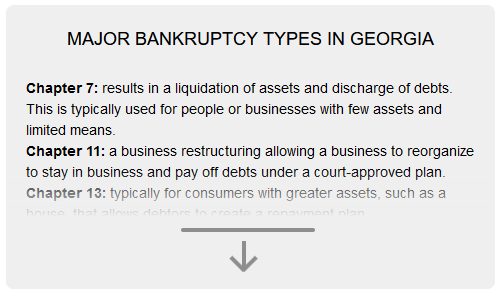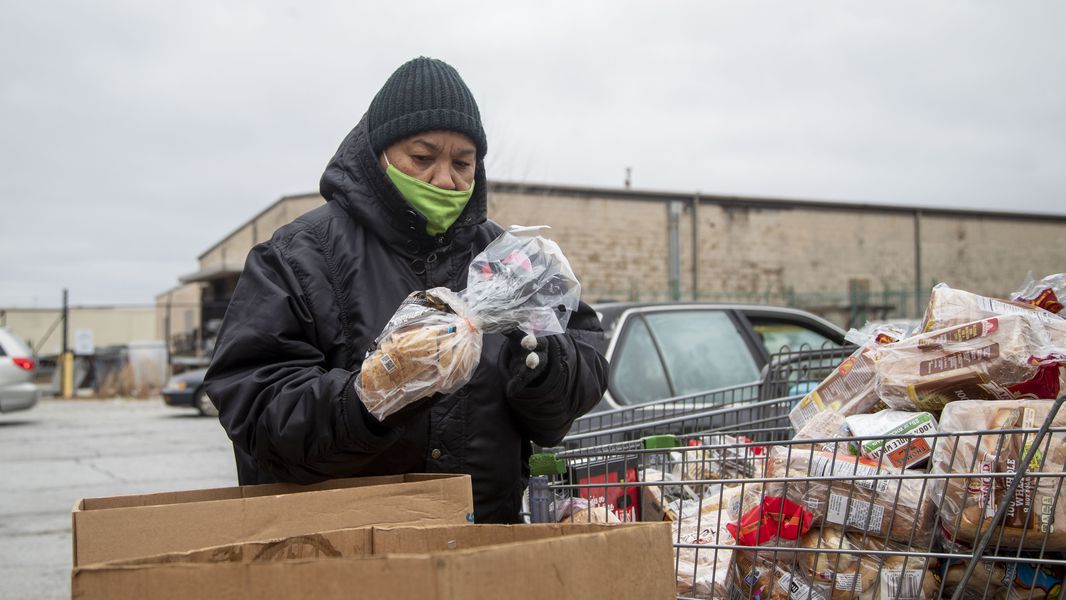
Dody Bunn sorts bread for families in need during a drive-through food pantry at the Hearts to Nourish Hope in Riverdale last month. “We’ve still got people falling through the cracks,” according to the nonprofit’s CEO. (Alyssa Pointer / [email protected])
By J. Scott Trubey, Nick Thieme and Emily Merwin DiRico
Government intervention checks bankruptcies, but ‘the bill is going to come due at some point,’ says one expert.
The cars start rolling into the parking lot of Hearts to Nourish Hope in Riverdale before dawn every Tuesday and Thursday.
Numbers placed on windshields tell volunteers how many boxes of groceries each family will receive from the morning’s Atlanta Community Food Bank delivery.
Deborah Anglin, Hearts to Nourish Hope CEO, said the mobile food pantry still serves about 1,200-1,400 families per week, handing out boxes containing meat, cheese, produce and pantry staples. The number is down a little from the peak last summer, but it’s more than double the number of families the pantry served each week before the coronavirus hit Georgia.
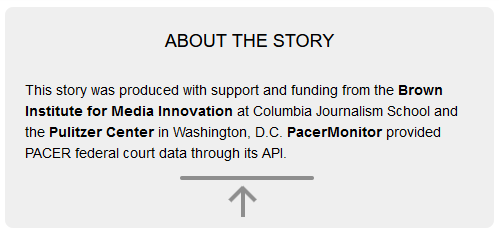
A year into the pandemic, Anglin said food insecurity is high and people are wrestling to get unemployment assistance from an overloaded state bureaucracy.
“We’ve still got people falling through the cracks,” Anglin said.
Scenes such as this one unfold across Georgia as thousands of residents cope with the financial blow of the virus.
The national vaccination campaign underway promises to safeguard Georgians’ health. But the economic toll of lost jobs, closed businesses, reduced earnings, drained savings and mounting personal debt could take much longer to heal.
This year, The Atlanta Journal-Constitution is examining how the pandemic impacted the financial wellbeing of Georgians across the state.
As part of the reporting, the AJC is collecting and analyzing thousands of Georgia bankruptcy filings, which provide a detailed record of financial hardship for some of the hardest hit individuals and businesses.
So far, the bankruptcy news is mostly good. More than a third fewer Georgians filed for bankruptcy in 2020 during the pandemic than the year before it, the AJC’s analysis found, which experts attributed to government intervention.
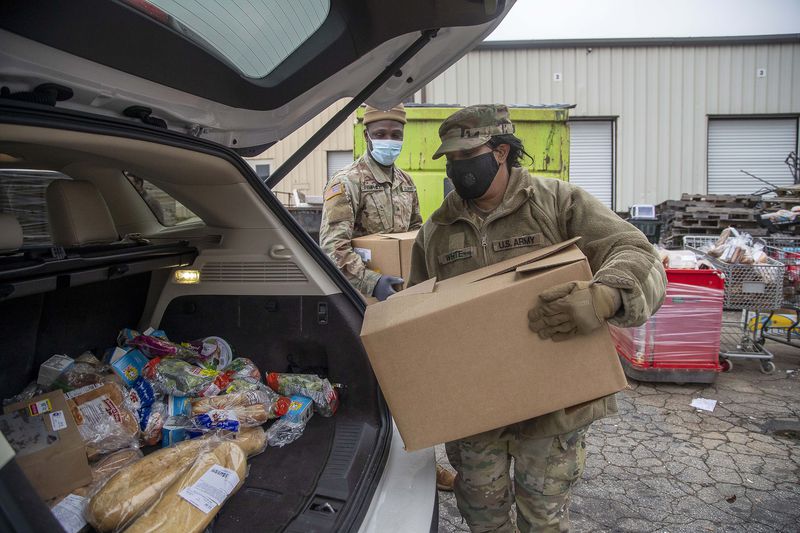
U.S. Army National Guardsman Nukonda White, front, and Sergeant John Pamphile helped load groceries at the Hearts to Nourish Hope food pantry in Riverdale last month. (Alyssa Pointer / [email protected])
Stimulus checks, expanded unemployment benefits and moratoria on evictions and foreclosures kept many Americans out of bankruptcy court, they said, and delayed filings that would have happened without the pandemic. The experts also said that many lower-income filers simply can’t afford bankruptcy.
Bankruptcies are a lagging economic indicator, and come when a person or business has run out of options. During the Great Recession, bankruptcies peaked not during the crisis but the year after it was officially over.
Though still below pre-pandemic levels, bankruptcies are creeping back up in Georgia in 2021 after a sharp decline last year, the AJC found. The uptick comes as pandemic unemployment benefits expire March 14 and Democrats in both chambers of Congress try to win final approval of a $1.9 trillion rescue package that could blunt additional financial harm and delay the bankruptcy wave that experts say is surely coming.
Some of the leading economic indicators of Georgians’ distress from the past year are already clear:
– About one-in-five households with children in Georgia can’t afford enough to eat, U.S. Census surveys show. Though down from the peak — nearly a third more Georgians were on food stamps in December compared to the beginning of last year.
– The unemployment rate in Georgia has fallen to less than half of the post-lockdown high of 12.6% in April, but as of December the state still was about 93,000 jobs short of where it was before the pandemic.
– Some 50,000 Georgia jobs remain lost in the hard-hit hospitality sector — jobs more likely to be held by women and people of color — and a sector not likely to fully rebound until the virus is contained.
– About 450,000 Georgia workers remain on some form of unemployment, 80,000 others are awaiting approval of benefits and another 180,000 are appealing a previous denial.
Measured by the unemployment rate, Georgia’s economy is rebounding faster than the national average. Economists forecast a year of robust growth, banking on the federal rescue package and the national vaccination campaign.
The much talked about K-shaped recovery — where the generally well-off quickly bounce back and poorer people don’t — is already apparent.
People who could work from home or didn’t lose their jobs have fared relatively well, experts say. In fact, many middle- and high-income households paid down debt, as evidenced by declining debt loads and lower rates of delinquencies on credit cards and other lines of credit than when the pandemic started, according to data from Equifax.
Tom Aliff, who heads Equifax’s risk consulting team, noted credit card, auto and home loan borrowers who got temporary payment relief later fell behind on their payments at a higher rate than borrowers who didn’t seek relief. In other words, well off people are doing so well it’s masked a delinquency trend among consumers in distress.
”The upper end of the K is outweighing the lower end of the K,” Aliff said.
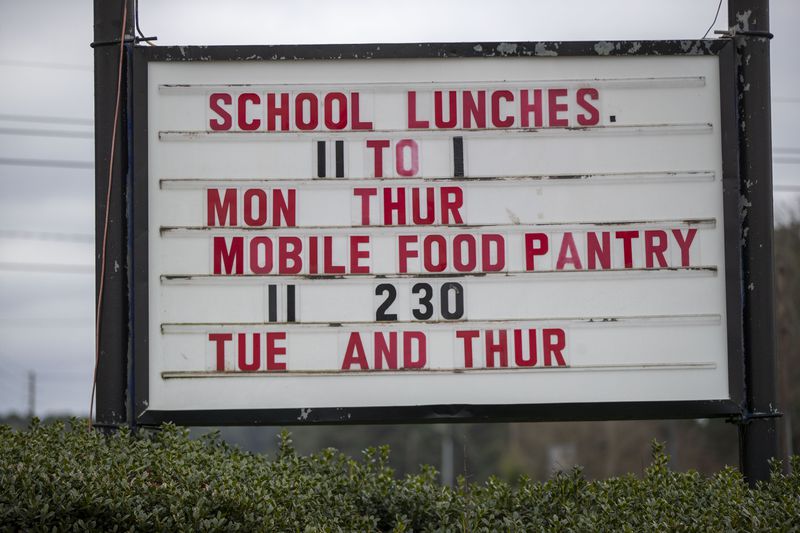
The Hearts to Nourish Hope mobile pantry in Riverdale displays its operating hours. The post-COVID recovery is already starting to look like one where the generally well-off quickly bounce back and poorer people don’t. (Alyssa Pointer / [email protected])
But the future remains tenuous for those Georgians who lost jobs in hard-hit sectors such as retail and hospitality and those who were already teetering financially.
The federal rescue packages passed last year kept millions across the country and likely hundreds of thousands in Georgia in their homes. But back rent and late mortgage payments continue to build. Ultimately, those debts will have to be repaid, forgiven or settled in bankruptcy court.
“Many people have exhausted their savings. They don’t have a safety net to rely on,” said Alex Camardelle, senior policy analyst at the left-leaning Georgia Budget and Policy Institute. “Folks tapped out a long time ago.”
‘I’m so high up in debt’
About 180,000 Georgians who were initially denied unemployment benefits have appeals pending.
One of those stuck in limbo is Anika Williams.
Williams, 45, worked as an independent contractor delivering school buses throughout the U.S. and Canada before the virus. When the pandemic hit, and schools went into lockdown, “Nobody needed school buses,” she said.
Williams said she made about $80,000 in 2019. She had about eight months’ worth of savings and had planned to start looking for a house to buy in 2020.
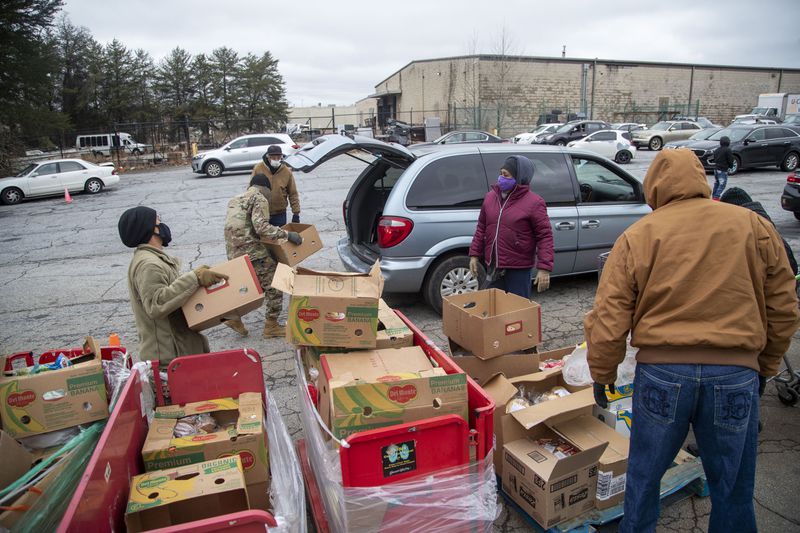
Volunteers and members of the U.S. Army National Guard load groceries at the Hearts to Nourish Hope mobile pantry in Riverdale last month. Though still below pre-pandemic levels, bankruptcies are creeping back up in Georgia in 2021 after a sharp decline last year, the AJC found. (Alyssa Pointer / [email protected])
In April, Williams filed for Pandemic Unemployment Assistance, a new benefit created for independent contractors and others who wouldn’t ordinarily be eligible for federal jobless benefits.
She sent her documentation. Then she waited and waited, calling the unemployment hotline every day.
But Williams said she could rarely get through to an operator and at other times she got runaround from the Department of Labor. Meanwhile, she said other independent contractors she knew were awarded PUA assistance.
Williams said she’s stayed with her parents and friends while her savings ran dry.
“I’m so high up in debt,” she said. “It’s sad to have to borrow money from people to buy toothpaste, soap and tissue.”
If she can get unemployment benefits, she said she can bounce back and pay her debts.
Williams sought help from Atlanta Legal Aid Society when she learned of a lawsuit the non-profit filed against the state labor department. Only then did Williams get a response — a denial letter in January that her legal aid attorney, Miriam Gutman said was “completely wrong.”
Bankruptcies are a lagging economic indicator, and come when a person or business has run out of options. During the Great Recession, bankruptcies peaked not during the crisis but the year after it was officially over.
In its letter, the Department of Labor said it had no record of Williams earning an income and said COVID-19 wasn’t the cause of her joblessness, Gutman said. Her appeal could take six months, she said.
Meanwhile, food stamps she applied for and received were briefly interrupted in error, Gutman said, because the state said Williams was on unemployment.
Williams said she fears her car will be repossessed. The owner of her storage unit has demanded rent she doesn’t have. She said the most valuable possession in her unit is photos of her family she hopes she won’t lose.
The bankruptcy bubble
Experts say government efforts to prop up the economy — including stimulus checks, expanded unemployment benefits and orders to halt evictions and foreclosures — prevented a flood of destitute people from seeking bankruptcy protection.
Some debtors were so destitute they couldn’t afford to file.

Bob Wertz, a member of the Fayette Samaritans, donates food at the drive-through food pantry at the Hearts to Nourish Hope in Riverdale last month. Federal rescue packages helped millions across the country, but back rent and late mortgage payments continue to build, and ultimately will have to be repaid, forgiven or settled in bankruptcy court. (Alyssa Pointer / [email protected])
Jialan Wang, a University of Illinois finance professor who studies bankruptcy, found that some bankruptcy filings actually increased following federal stimulus payments.
“When the government gave out more money, Chapter 7 filings actually increased,” Wang said. “It allows a lot of people to pay for bankruptcy.”
Patience on the part of creditors also played a role.
Credit card companies, banks and other creditors put off filing lawsuits seeking the money they’re owed, because for millions of cash-strapped debtors, there likely wasn’t much money to get, experts told the AJC.
At their lowest, in April of 2020, Georgians filed about half as many bankruptcies of all sorts than they did the year before, the AJC found.
Since June, however, bankruptcy numbers have slowly but steadily crept upwards, culminating in a late-January spike that saw weekly bankruptcies of all kinds in every bankruptcy court in Georgia at nearly pre-pandemic levels.
Bankruptcy filings in Georgia
The AJC analyzed tens of thousands of individual bankruptcy records obtained through Pacermonitor, a legal research company which collects national bankruptcy data.
These charts show the smoothed and seasonally adjusted percent change in weekly bankruptcy filings over 2019 by filing type and court jurisdiction as thick lines. The thin lines show the unadjusted figures.
As the economy improves, the jobless return to the workforce and moratoria expire, that’s when creditors will likely begin to squeeze borrowers. And that, experts say, is when many people may flock to the courthouse doors.
“The bill is going to come due at some point,” said Ed Flynn, an analyst at the American Bankruptcy Institute (ABI) in Washington, D.C.
Government intervention has kept distressed borrowers “in suspended animation,” said Carol Colliersmith, an Atlanta bankruptcy lawyer.
Many financial experts predict a rise in bankruptcies will follow the pandemic, making up for a lost year in 2020 and those pushed over the edge by the pandemic.
It just isn’t clear when.
A foreclosure quirk in Georgia
The foreclosure moratorium might have played an outsized role in keeping bankruptcy filings low in Georgia, experts told the AJC.
In most states, most consumers file for Chapter 7 bankruptcy, the code section typically for debtors with fewer assets, which are liquidated before debts are discharged. But Georgia is a high Chapter 13 state, the consumer bankruptcy code for debt restructuring.
This is most likely because of Georgia’s rapid, non-judicial foreclosure process, which allows banks to take back homes quickly.
Flynn, the ABI bankruptcy analyst, said Georgia filings tend to spike right before “foreclosure Tuesday,” the first Tuesday of each month, when lenders conduct auctions on the courthouse steps. A Chapter 13 filing can temporarily halt a foreclosure.
With foreclosures largely halted in Georgia, Chapter 13 filings declined 44%, the largest decline among the three main categories, ABI data show.
People tend to file for bankruptcy when something pushes them into it, said Colliersmith, the Atlanta bankruptcy lawyer. It can be a foreclosure filing, creditor lawsuit, eviction notice, or a vehicle repossession.
Some creditors know their debtors don’t have assets to collect, Colliersmith said.
“There’s no reason to sue somebody if they don’t have anything,” she said.
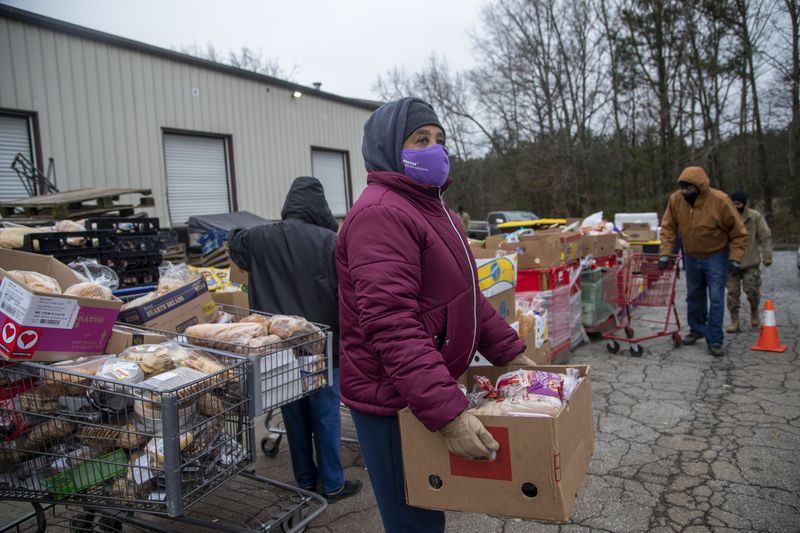
Volunteer Ida Boswell loads a box of food in the trunk of a family in need during at the Hearts to Nourish Hope mobile food pantry in Riverdale last month. Experts say that the foreclosure moratorium might have played an outsized role in keeping bankruptcy filings low in Georgia. (Alyssa Pointer / [email protected])
‘Hardship, angst and anxiety’
Public policy can make it more or less consumer friendly for people to file for bankruptcy, and Congress could enact measures that influence how those harmed by the pandemic rebuild their finances.
But for the moment, poor and working-class Georgians face the hardest road to recovery. Improvements in unemployment have largely benefited the upper end of the job market.
According to data from Opportunity Insights, the number of high-paying jobs in Georgia, those earning more than $60,000 per year, were up 5% in December compared to pre-pandemic levels. But lower earning jobs, those paying $27,000 or less, were still down nearly 15% compared to pre-pandemic days.
“Many people have exhausted their savings. They don’t have a safety net to rely on. Folks tapped out a long time ago.”
– Alex Camardelle, senior policy analyst at the left-leaning Georgia Budget and Policy Institute
About 8.7% of mortgages were delinquent in Georgia at the end of last year, compared to 7.2% nationwide, according to the Mortgage Bankers Association. But the picture was much worse for non-conventional loans, or ones that tend to go to lower-income borrowers or ones with lower credit scores.
The delinquency rate for Federal Housing Administration-backed mortgages was 17.6% in Georgia, compared to 14.7% nationwide.
“The middle class or upper middle class — homeowner population — seem to have benefited more than lower income households from the stimulus measures,” said Wang, the Illinois professor.
Homeowners also stand to benefit from the strong housing market.
“Homeowners have a lot of equity in their homes,” said Marina Walsh, vice president of industry research at the Mortgage Bankers Association. “They don’t want to strategically default. They’re not underwater. They’ve got a stake in that house.”
Today, there are more buyers than available houses and values have grown. That means borrowers will likely come out of this downturn in a better position than in the housing crisis to negotiate new mortgage terms with their lenders or be able to sell their homes if they can’t, Walsh said.
The prognosis for troubled renters is bleaker.
“I’m so high up in debt. It’s sad to have to borrow money from people to buy toothpaste, soap and tissue.”
– Anika Williams, independent contractor
Though many have been granted forbearance on their leases, it’s not loan forgiveness, and many renters will have to repay months of back rent to their landlords or work out a deal, said Chris Tierney, a partner at Moore Colson, an accounting and advisory firm that specializes in business receiverships. An eviction can make it extremely difficult to find a new home.
Many landlords are struggling too, particularly smaller investors who financed the purchase of their rental properties with bank loans they must repay, Tierney said.
Gutman, the Atlanta Legal Aid Society attorney, said her organization is beginning to field more calls from clients trying to fight off eviction. Though the moratoria remain in place, some counties are allowing landlords to proceed with evictions anyway.
The federal government late last year provided $25 billion in assistance nationally to renters who lost incomes and to help landlords. But states have had difficulty distributing the funds. So far, about $552 million has been earmarked for Georgia.
Another $20 billion nationally could come in the new financial rescue package under debate in Congress.
Tierney said he fears a wave of evictions — and debtor lawsuits — once moratoria are lifted. Landlords have bills to pay, too.
“I think this is going to create tremendous hardship, angst and anxiety,” he said.
How we got the story
With special nonprofit funding, the AJC is reporting the financial impact of the coronavirus pandemic in Georgia through federal bankruptcy filings and other data. Among the most complete record financial hardship, bankruptcy filings will help AJC journalists quantify and explain the pandemic’s toll on Georgia’s residents and businesses over the next year.
The original story on AJC.com.


